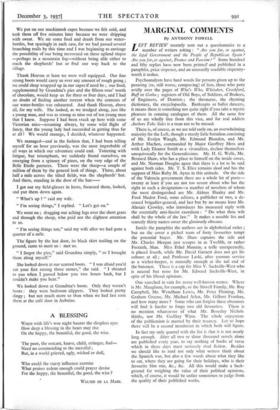MARGINAL COMMENTS
By ANTHONY POWELL
LEFT REVIEW recently sent out a questionnaire to a number of writers asking : " Are you for, or against, the legal Government and the People of Republican Spain ? Are you for, or against, Franco and Fascism ?" Some hundred and fifty replies have now been printed and published in a pamphlet, price sixpence, and an unusually readable sixpenny- worth it makes.
Psychoanalysts have hard words for persons given up to the perusing (or, still worse, compos ing) of lists, those who pore avidly over the pages of Who's Who, Whitaker, Crockford, Ruff or Gotha ; registers of Old Boys, of Soldiers, of Brokers; of Engineers, of Dentisti ; the thesaurus, the rhyming dictionary, the encyclopaedia. Bankrupts or ballet dancers, it means there is something not quite right if you take a mystic pleasure in conning catalogues of them. All the same few of us are wholly free from this vice, and for real addicts Authors Take Sides is a treat not to be missed.
There is, of course, as we are told early on, an overwhelming majority for the Left, though a sturdy little battalion consisting of Mr. Evelyn Waugh, Mr. Edmund Blunden, and Mr. Arthur Machen, commanded by Major Geoffrey Moss and with Lady Eleanor Smith as a vivandiere, declare themselves unequivocally for the Generalissimo. Mr. H. G. Wells, Mr. Bernard Shaw, who has a place to himself on the inside cover, and Mr. Norman Douglas agree that there is a lot to be said against both sides. Mr. T. S. Eliot remains aloof and has the support of Miss Ruby M. Ayres in this attitude. On the side of the Valencia government there are a whole lot of poets— twenty at least if you are not too severe about who has the right to such a designation—a number of novelists of whom the most distinguished are Mr. Aldous Huxley and Mr. Ford Madox Ford, some editors, a publisher or two, a de- ceased brigadier-general, and last but by no means least Mr. Alastair Crowley, who introduces his measured reply with the essentially anti-fascist exordium : " Do what thou wilt shall be the whole of the law." It makes a notable list and scarcely thirty names cover the gloriously obscure.
Inside the pamphlet the authors are in alphabetical order; but on the cover a picked team of forty favourites tempt the potential buyer. Mr. Shaw captains the side and Mr. Charles Morgan just scrapes in as Twelfth, or rather Fortieth, Man. Miss Ethel Mannin, a trifle unexpectedly, is placed fourth, while Mr. David Garnett does not get his colours at all ; and Professor Laski, after yeoman service as a wicket-keeper, is naturally enough at the tail end of the batsmen. There is a cap for Miss V. Sackville-West who is neutral but none for Mr. Edward Sackville-West, in spite of his liberal opinions.
One searched in vain for many well-known names. Where is Mr. Maugham, for example, or the Sitwell Family, Mr. Roy Campbell, Mr. Wyndham Lewis, Mr. Peter Fleming, Mi. Graham Greene, Mr. Michael Arlen, Mr. Gilbert Frankau, and how many more ? Some who can forgive these absentees will find it harder to forgo two old favourites. There is no mention whatsoever of what Mr. Beverley Nichols thinks, nor Mr. Godfrey Winn. The whole enjoyment of the publication is marred by their truancy. Let us hope there will be a second instalment in which both will figure.
In fact my only quarrel with the list is that it is not nearly long enough. After all two or three thousand novels alone are published every year, to say nothing of books of verse which in these days must seriously rival fiction. Besides we should like to read not only what writers think about the Spanish war, but also a few words about what they like to eat, where they are going for their holidays, who is their favourite film star, &c., &c. All this would make a back- ground for weighing the value of their political opinions, which, of course, it would be unfair sometimes to judge from the quality of their published works.


























































 Previous page
Previous page